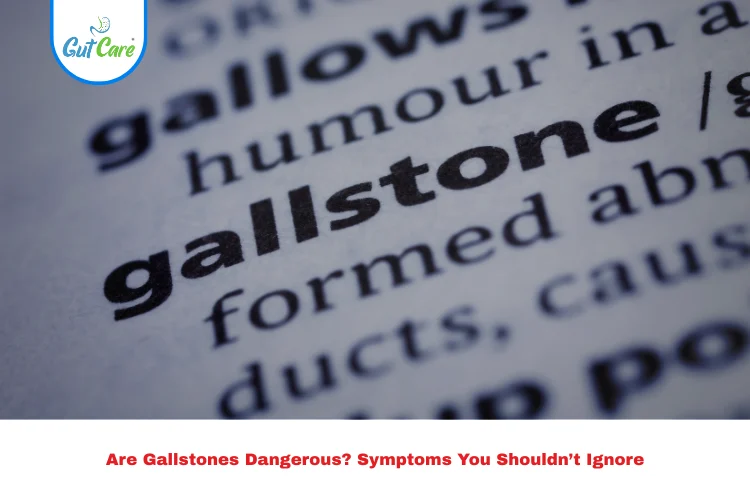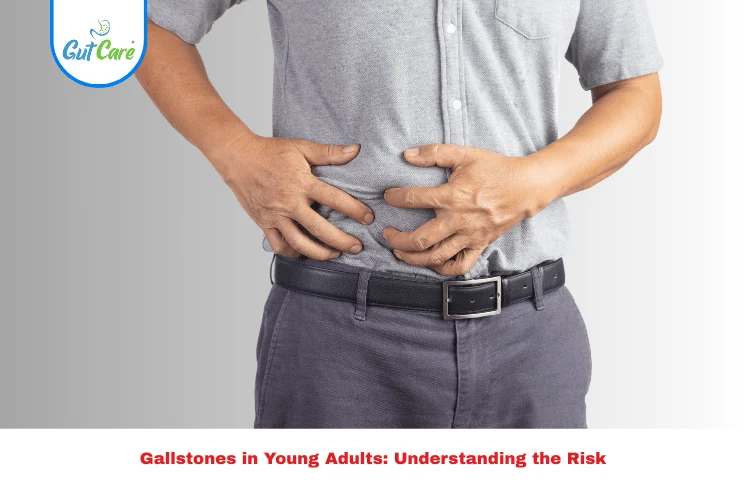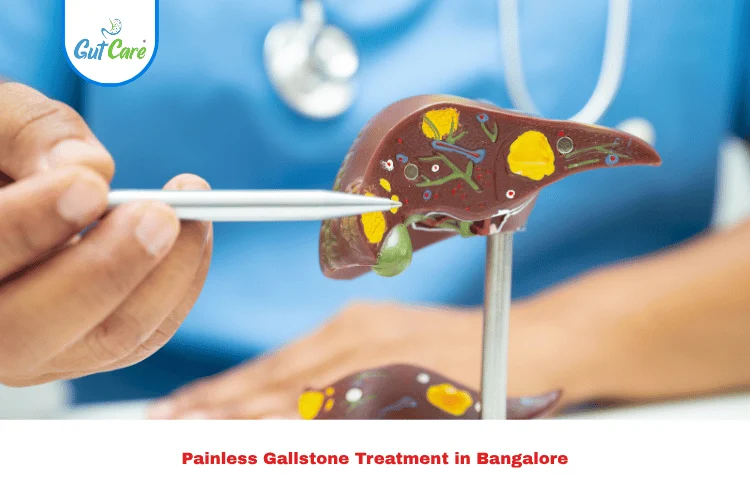Gallstones are a common digestive issue that affects millions of people worldwide. But are gallstones dangerous? Understanding the risks, symptoms, and treatment options is crucial, especially if you experience severe abdominal pain or digestive problems. At Gutcare Clinics in Bangalore, our specialist, Dr. Yuvrajsingh Gehlot, emphasizes the importance of timely diagnosis and treatment to prevent complications.
Gallstones form when substances in bile, such as cholesterol or bilirubin, harden into small stones. While some people never experience symptoms, others may face severe health risks. In this article, we’ll explore the dangers of gallstones, how to recognize them, and when to seek expert advice.
What Are Gallstones?
Gallstones are solid particles that develop in the gallbladder, a small organ located under the liver that stores bile. Bile helps digest fats, but an imbalance in its components can lead to the formation of stones. Gallstones vary in size—some are as tiny as a grain of sand, while others can grow as large as a golf ball.
Types of Gallstones:
- Cholesterol Gallstones – Most common; formed primarily from cholesterol.
- Pigment Gallstones – Dark stones made of bilirubin, often linked to liver disease.
- Mixed Gallstones – Contain a combination of cholesterol, bile salts, and calcium.
Symptoms of Gallstones
Not everyone with gallstones experiences symptoms. When symptoms do appear, they often include:
- Sudden, intense pain in the upper right abdomen
- Pain between the shoulder blades or in the right shoulder
- Nausea and vomiting
- Indigestion, bloating, and gas
- Fever and jaundice in severe cases
Persistent or worsening symptoms indicate a need for medical attention. A specialist like Dr. Yuvrajsingh Gehlot can provide accurate diagnosis using ultrasounds or other imaging techniques.
Are Gallstones Dangerous?
So, are gallstones dangerous? The answer depends on the severity and whether complications arise. While many gallstones are harmless and require minimal intervention, others can lead to serious conditions:
1. Gallbladder Inflammation (Cholecystitis)
Gallstones can block bile flow, causing inflammation and infection. Symptoms include severe abdominal pain, fever, and vomiting. Immediate medical care is required.
2. Blocked Bile Ducts
A gallstone may block bile ducts, leading to jaundice, severe pain, and liver damage. This situation often requires urgent intervention.
3. Pancreatitis
Gallstones can sometimes block pancreatic ducts, resulting in inflammation of the pancreas, which can be life-threatening if untreated.
4. Gallbladder Cancer (Rare)
Long-term gallstone obstruction may slightly increase the risk of gallbladder cancer, though it is rare.
Because complications can escalate quickly, it’s essential to consult a specialist if you notice any of the above symptoms. Gutcare Clinics in Bangalore offers advanced diagnostic and treatment options to address gallstones safely.
Diagnosis and Consultation
Early diagnosis can prevent complications. Diagnosis usually involves:
- Ultrasound: The most common method to detect gallstones.
- CT Scan or MRI: For detailed imaging in complex cases.
- Blood Tests: To check liver function and signs of infection.
Dr. Yuvrajsingh Gehlot, a renowned specialist at Gutcare Clinics, emphasizes the importance of personalized treatment plans. He advises patients based on symptom severity, gallstone size, and overall health.
Treatment Options
Treatment for gallstones depends on the presence of symptoms and complications:
- Watchful Waiting – For asymptomatic cases, regular monitoring may suffice.
- Medications – Some oral medications can dissolve cholesterol stones, though this is often slow and less effective.
- Surgery (Cholecystectomy) – The most common treatment for symptomatic gallstones. Laparoscopic surgery is minimally invasive and widely recommended.
- Lifestyle Changes – A healthy diet, weight management, and hydration can reduce gallstone formation risk.
Always consult a specialist before deciding on a treatment plan to ensure safe and effective care.
Preventing Gallstones
While not all gallstones are preventable, you can reduce your risk with:
- Balanced diet low in saturated fats
- Regular physical activity
- Maintaining a healthy weight
- Avoiding rapid weight loss
Preventive strategies are particularly important for people with a family history of gallstones.
When to See a Specialist
If you experience severe abdominal pain, nausea, fever, or jaundice, don’t wait. Immediate consultation with a specialist like Dr. Yuvrajsingh Gehlot at Gutcare Clinics can prevent complications and ensure appropriate treatment. Early intervention saves both discomfort and potential health risks.
Summary
So, are gallstones dangerous? They can be, especially if they cause blockage, infection, or pancreatitis. While some gallstones remain harmless, others require intervention. Early diagnosis, expert consultation, and proper treatment are key. Gutcare Clinics in Bangalore, led by specialists like Dr. Yuvrajsingh Gehlot, provides comprehensive care for gallstone management. Remember, if symptoms persist or worsen, seek medical advice promptly.
FAQs
1. Are all gallstones dangerous?
Not all gallstones are dangerous. Many people have asymptomatic stones that do not require treatment. However, symptomatic gallstones can lead to severe complications if ignored.
2. What are the symptoms that indicate gallstones are dangerous?
Severe abdominal pain, nausea, vomiting, jaundice, and fever are warning signs. Immediate consultation with a specialist is recommended.
3. Can gallstones be treated without surgery?
Yes, some gallstones can be managed with medications or lifestyle changes, but surgery is often the most effective treatment for symptomatic cases.
4. How can Gutcare Clinics help with gallstones?
At Gutcare Clinics, Bangalore, our specialist, Dr. Yuvrajsingh Gehlot, provides diagnosis, personalized treatment, and surgical solutions for gallstone management.
5. Can gallstones lead to other complications?
Yes, untreated gallstones may cause inflammation, pancreatitis, or blocked bile ducts, which can be dangerous and require urgent care.




